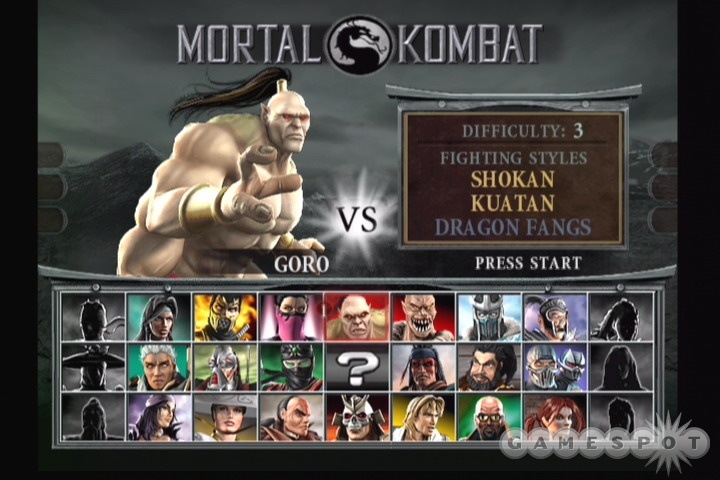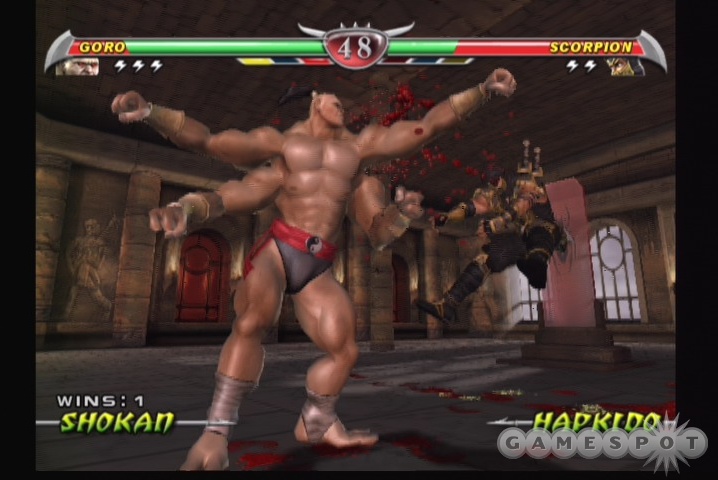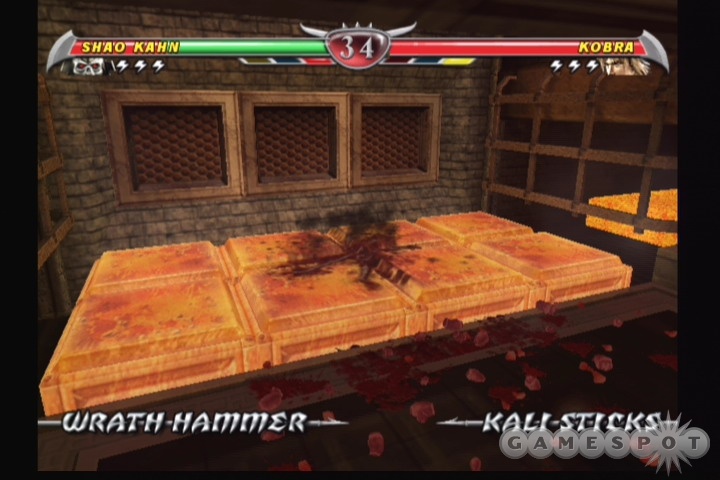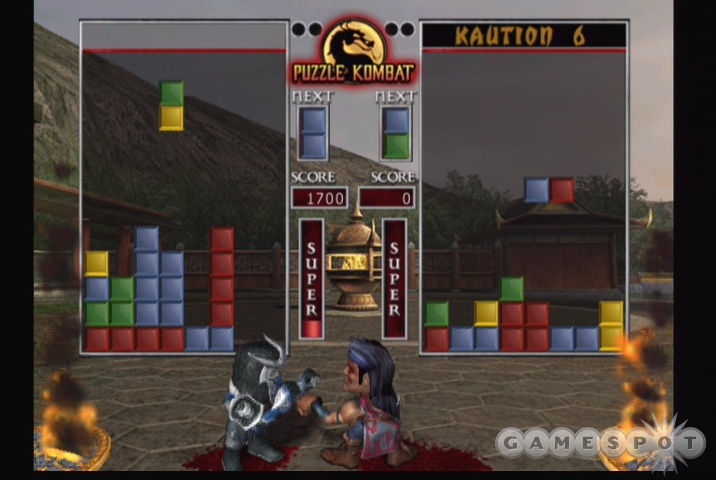The latest in Midway's influential and long-running fighting game series, Mortal Kombat: Deception, picks up where 2002's Mortal Kombat: Deadly Alliance left off by featuring lots of new and returning fighters and a variety of surprising new modes of play. The new GameCube version of the game, released some months after Deception's debut on the PS2 and Xbox, lacks the earlier versions' most compelling feature--the ability to play online--but partly makes up for that (and lost time) with a couple of classic characters exclusively added to this roster. The strangest part about Deception is how it includes several completely off-the-wall modes, the likes of which you'd never expect from a fighting game. These are the single-player konquest mode, which is a story-driven adventure; puzzle kombat, a competitive Tetris-style puzzle game that's an unabashed homage to Capcom's Super Puzzle Fighter II Turbo; and chess kombat, which is inspired by the classic computer game Archon. The konquest mode is disappointingly bland, while these other two modes are at least amusing. However, the core one-on-one fighting action is easily the best part of the game. It's gory, intense, and quite complex, meaning it captures much of what has made MK an institution among fighting games.

Those familiar with the other versions of Deception will find that the GameCube version is identical for the most part, though it does have a few key differences. Yeah, it's too bad there's no online play, but you do get two new characters, both playable right from the get-go. Shao Kahn is the stronger and tougher-looking of the two, although each one is a respectable facsimile of his classic MK counterpart. Each also has his signature moves (Shao Kahn has his sledgehammer and his taunts, for example), plus a bunch of new ones. Goro looks a bit anemic, but all in all, these two fit in well with the rest of the cast, and they're a nice bonus. The other thing about the GameCube version of Deception is that many more characters are unlocked right up front (including Hotaru, Kira, and everyone's favorite, Noob-Smoke), so you immediately get a total of 20 fighters to choose from, whereas the PS2 and Xbox versions have only 12 initially playable. This means there's less reason to play through konquest mode, the key to unlocking most of the game's hidden content. Konquest mode is a drag, so this is a good thing.
The fighting system in Deception hasn't changed much from that of Deadly Alliance. Once again, the main twist that distinguishes this game from other 3D fighting games is that each character may freely switch between three different martial arts styles during battle--one of which is always a weapon-based style of some sort. Each character possesses a handful of unique special moves, as well as a bunch of different chain combos, some of which involve switching between different martial arts styles in midcombo. The sheer variety of different martial arts featured in MK: Deception is quite impressive, and the overall look and feel of the action is clearly inspired by kung fu movies--to good effect. Whereas many fighting games take their cues from anime and aim for action that looks more stylish than downright painful, MK: Deception goes for the hard-hitting staccato rhythms of Hong Kong action cinema and doesn't skimp on graphic violence. The results don't always look perfectly fluid or natural--especially since many of the characters look rather stiff--but the fighting in MK: Deception nevertheless features a ton of painful-looking moves that cause the opponent on the receiving end to reel backward, oftentimes gushing blood. The fighting action is ridiculously over the top, and, as a result, it's often quite funny.

There's a good, responsive feel to the action. The game plays OK using the stock GameCube controller, despite the small D pad and asymmetrical button layout. There's decent variety within the roster of selectable characters as well. In MK tradition, the fighters here aren't drastically different from one another. Though their special moves and combos are unique, it's not difficult to learn how to play as the different characters once you've grasped the basic game mechanics. The typical match unfolds as your average best-two-out-of-three-rounds fighting game battle, but MK: Deception does have a few twists. For one thing, it's now possible to execute combo breakers (in a nod to the fighting game Killer Instinct) that let you instantly disrupt the opponent when you're on the receiving end of a string of attacks. Combo breakers are really easy to perform, but the catch is that you can use these only a few times during a match, and they cause no damage to the opponent. So they introduce a welcome bit of strategy to a match. Should you use your breakers right away or try to save them to turn the tables at the end of a match? MK: Deception makes a few other tweaks to Deadly Alliance's gameplay, such as eliminating the powerful impaling moves from that game and adding (back) a whole bunch of uppercut attacks--MK standbys that seemed noticeably absent from Deadly Alliance.
Another welcome addition is how most of the battle arenas in MK: Deception feature death traps that may instantly end a round, either for a satisfying finish or a surprise comeback. For example, Mortal Kombat's classic "pit" stage returns (and MKII's acid-filled "dead pool" level is in here too), but this time, you don't need to wait until the end of a match to knock your enemy onto the spikes below. Now, if you just get him or her near the edge of the elevated platform, you can uppercut the poor sap to certain death. Should you die in this fashion, you lose only the round and not the match, which is something that's inexplicable but makes obvious sense from a gameplay standpoint. It's like a much messier version of Virtua Fighter's ring-outs. Death traps force you to be mindful of where you're fighting and mostly just help to make the combat more interesting. Plus, the death trap-related fatalities are pretty entertaining, so all in all, it's a much more fun addition to the game than you might expect. Still, if you really don't like the death traps, you can disable them.

Speaking of death, Deadly Alliance had just one fatality per fighter, but Deception has two, and most of these are barbaric and really gross, meaning they're excellent. In fact, it's fair to say that MK: Deception packs in some of the best, most brutal fatalities in the series to date. Another new addition to the series is the hara-kiri. Basically, players who have lost a match have the ability to punch in a command to perform a self-fatality. As a result, the losing player is given a sort of fatality advantage. Whereas the winning player must be in the proper position to execute a fatality, you can pull off a hara-kiri as quickly as you can punch in the command. So, in practice, you won't have much opportunity to pull off a fatality against someone who's memorized the hara-kiri maneuvers. It doesn't really matter either way, because--as in past MK games--fatalities are just for show. And they put on a great show indeed.
Soon enough, you'll be tempted to gain access to the game's variety of hidden characters, alternate outfits, and additional battle arenas. So, unfortunately, you'll have to stop playing the arcade mode and switch over to the aforementioned konquest mode. Konquest mode is definitely the weak point of MK: Deception. It's a surprisingly long and drawn-out third-person-perspective adventure game in which you, as an aspiring martial artist named Shujinko, will get to visit many of Mortal Kombat's multidimensional locales to meet many of its characters. Konquest mode also serves as a tutorial, since it will initially walk you through the basics of combat and teach you most of the different characters' various moves and combos. This all might sound great in theory, but in practice, konquest mode is ugly and dull. Shujinko's journey is just a series of very repetitive point-A-to-point-B fetch quests and combat training exercises that are punctuated only rarely by an actual good old-fashioned fight.
Fortunately, the puzzle kombat and chess kombat modes are much more successful than konquest mode, though they're also a little gimmicky. Puzzle Kombat is reminiscent of any number of competitive puzzle games, though the imitation is mostly skin-deep and doesn't quite capture the fast, responsive feel you'd like. You'll see pairs of colored blocks dropping from the top of the screen, both in your playing field and in your opponent's. Occasionally, special-colored icons fall instead of blocks, and if you match these up with blocks of like colors, all adjacent like-colored blocks will shatter, clearing part of your playing field and causing stray blocks to fall into your opponent's playing field. All this, of course, serves as a perfect abstract model for deadly combat.
Then there's chess kombat, a turn-based strategy game like chess--except that when two pieces meet on the map, you and your opponent must fight it out. You can cast a few single-use spells to aid you or hamper your opponent, but chess kombat will boil down to a lot of fights between you and your opponent's "grunts," which are like pawns in chess. So if you're playing chess kombat against someone of substantially greater or lesser skill, then it will be easy for the more-skilled player to gain the upper hand and quickly win. However, against a similarly skilled opponent, chess kombat often becomes a drawn-out stalemate. So while puzzle kombat and chess kombat are refreshingly different types of modes to include in a fighting game, don't expect them to take too much of your attention away from the actual fighting here.

MK: Deception retains its predecessor's great looks--occasional warts and all. The game's perfectly smooth frame rate does a lot to both help the visuals look good and make the flow of the action feel as fluid as possible. Audio is punctuated by the sorts of battle cries, screams, thuds, cracks, slams, and bass-heavy ambient music that has always been the hallmark of Mortal Kombat--which has always been one of the best-sounding fighting game series. The GameCube version of the game looks and sounds much the same as its PS2 and Xbox counterparts, and its loading times are similarly noticeable.
Deception is best suited for the series' fans, especially those who liked 2002's similar Deadly Alliance. The thing is, many of these players have already experienced the game on other platforms, though harder-core devotees might want to find the means to check this version out just to see Goro and Shao Kahn. At any rate, this is still a great game on its own merits, and the absence of online play doesn't hurt it too badly. After all, like any great fighting game, this one carefully strikes the balance of delivering fast-paced, hard-hitting thrills and rewarding lots of practice and complex tactics. Not all of Deception's modes and features are terrific, but the game has got it where it counts.